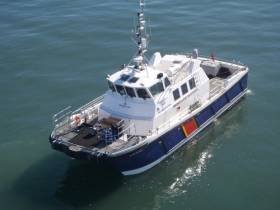Displaying items by tag: Alpha Marine
Wicklow Based Alpha Marine Acquire A Damen Shipyard Built Multicat
Wicklow Port based multi-disciplinary marine company, Alpha Marine has acquired a Damen Shipyard built multi-cat of their 2309 design, which had been operating in the Netherlands.
The purchase of the multicat from Purus HST of Swansea, Wales, was concluded in mid-December and represents a significant investment by the Irish marine consultancy company which has an existing fleet of five vessels providing tug, workboat charter and marine survey services.
AMS Retriever is the new name given to the multipurpose Dutch shipyard built vessel which will work throughout Europe in support of offshore and near shore energy projects, dredging as well as port infrastructure.
The shallow draft multicat is a powerful and versatile craft suitable for near coastal marine civil support projects. In addition the multicat is an ideal partner for dredge assist, towage, survey, anchor and buoy handling duties.
Equipped with powerful crane and winches, AMS Retriever has a bollard pull of 16.2 tonnes and has a Bureau Veritas (BV) classification giving the vessel plying limits for un-restricted navigation.
A deck load is available for 24 hour operations and a crew of 7 have accommodation in heated and air conditioned cabins.
With the AMS Retriever joining the company, Afloat highlights that a former tug of the same name is no longer part of the fleet.
Alpha Marine will undertake a geophysical survey campaign in relation to the Clogherhead Offshore Wind Farm off the coast of Co Louth from next Thursday 25 May to Wednesday 27 July.
The survey will be conducted by the Baltic Explorer (callsign LYBW) utilising multibeam echo sounders, sub-bottom profilers, side-scan sonars, magnetometers and ultra-high-resolution survey equipment.
Geophysical equipment will be both hull-mounted and towed. Typically, the towed cable lengths will be about four times the water depth while acquiring survey data.
The work will be conducted on a 24-hour basis and the work vessel will display appropriate lights and signals. Mariners are advised to keep continuous watch on VHF Channel 16 when navigating the area.
All other vessels operating within this area are requested to keep their distance and pass at minimum speed to reduce vessel wash.
Mariners are also asked to note that the start date and the duration of the activity are dependent on weather and work progress.
Coordinates of the survey area and contact details can be found in Marine Notice No 26 of 2022, attached below.
Wicklow Based Tug Supports Dredging Project at UK Windfarm
#ports&shipping - Wicklow based Alpha Marine are carrying out a dredging project off the UK south coast for an offshore windfarm project, writes Jehan Ashmore.
The vessel support and marine services company deployed the Husky, a twin screw shallow draft tug to conduct nearshore dredging support at the Rampion Offshore Windfarm.
Among the marine engineering plant involved in the project off the Sussex coast has been the ‘Spud’ barge Beluga. The vessel has been manoeuvred by Husky out of Shoreham Harbour which is a base for such operations.
This has involved the dredging spread for the excavation and backfill of the trench for the export cable leading from the Rampion Offshore Windfarm.
Wicklow Based Craft Completes Charter in North Sea
#Charter - Alpha Marine, formerly Island Shipping, based in Wicklow, has seen the return of one of its wind-farm support vessels following a survey charter in the North Sea, writes Jehan Ashmore.
The water-jet propelled Island Panther had been working in the Waddenzee, an intertidal zone of the Ems Estuary located between The Netherlands and Germany. Along this coast are the Frisian /Wadden Islands, an archipelago that lies off these countries and stretches as far as Denmark.
Island Panther which also is a crew transfer vessel, was deployed from the Dutch port of Ijmuiden to conduct the survey zone. The 17m craft operated in the ultra-shallow waters of the survey site.





























































